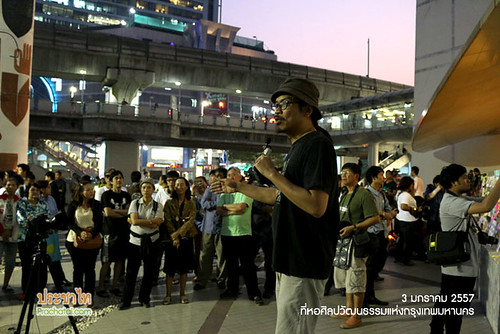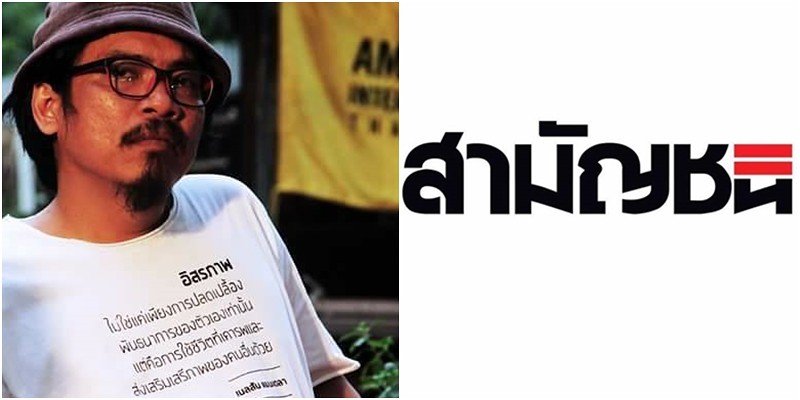Kittichai Ngamchaipisit is one of the founders of the Commoners Party, nearly 10 years in the making by activists who aim to amend the constitution for increased citizen participation and eventually hold a new referendum on their draft constitution. Kittichai likens the Party to a market where civil society groups can sell their policies. The Commoners Party hopes for seats in parliament as one wing of the civil society movement as a policy bridge to parliament. Even if they do not win any seats, Kittichai says, the party will continue to fight for citizens.
Kittichai Ngamchaipisit, one of the founders of the Commoners Party, and the logo of the party
Since the Election Commission of Thailand allowed political parties to register as of March 2, 42 parties have registered. Some stand out due to their novel names that draw interest, such as the “Selfish Party.” Another interesting group to watch is the Commoners Party.
A representative from the Commoners Party presents registration documents on March 2.
Prachatai interviewed Kittichai Ngamchaipisit, one of the Commoners Party founders, on the party’s policies and ideologies. Kittichai is a former activist of the Pho Kan Ti group that held a candlelight vigil to protest and call for elections on 2 February 2014. Among activist circles Kittichai is known as “Uan YT” since he worked at a Youth Training Center that works with young people.
The Commoners Party has been 10 years in the making by activists, who had planned to register in 2014 – but then the coup happened
The current constitution has many criticisms that the election model is problematic, so why are they preparing to field candidates?. Kittichai says that on principle, he disagrees with this constitution’s origins and does not really agree with its content.
“We already discussed why we accepted [this constitution]. I think that no matter what, we have to amend the constitution, how will we do it? There are not many ways. One way is for a large-scale movement to rise up on the streets and fight. This is one way. Another way is about fights within Parliament, which is very difficult because the mechanisms have been put in place to make amendment difficult. Both ways seem like dead ends. So we think that one of the party’s stands can be to try and amend the constitution in a way that comes from the people as much as possible,” Kittichai said. He continued to explain that this constitution should be fixed by citizens and their participation. There should be new mechanisms for drafting a constitution and the procedure for a new referendum, but they must be realistic. Still, Kittichai is firm on the stance that the constitution should come from the people, not one small group of drafters.
Amending the constitution with citizen participation in the draft and holding a new referendum
The current constitution has many criticisms that the election model is problematic, so why are they preparing to field candidates?. Kittichai says that on principle, he disagrees with this constitution’s origins and does not really agree with its content.
“We already discussed why we accepted [this constitution]. I think that no matter what, we have to amend the constitution, how will we do it? There are not many ways. One way is for a large-scale movement to rise up on the streets and fight. This is one way. Another way is about fights within Parliament, which is very difficult because the mechanisms have been put in place to make amendment difficult. Both ways seem like dead ends. So we think that one of the party’s stands can be to try and amend the constitution in a way that comes from the people as much as possible,” Kittichai said. He continued to explain that this constitution should be fixed by citizens and their participation. There should be new mechanisms for drafting a constitution and the procedure for a new referendum, but they must be realistic. Still, Kittichai is firm on the stance that the constitution should come from the people, not one small group of drafters.
The party is a market where the people’s sector sells their policies
On party policies, the founder of the Commoners Party says they come from 2 sources because the constituents of the party will try to encourage civil society to use the party to their advantage.
“The approach of the party doesn’t have policies that are already thought out and sold to voters. In principle, we will try buying polices, asking for policies,” Kittichai said, explaining that the party acts like a shop where civil society groups can bring their policies for display, when you have worked a lot with the target groups, and know that these policies would really help people in society. But in the past they had no chance to present their ideas, or they presented them and no one listened, or they don’t know the channels to present them. They can come here and join the party assembly process to screen the policies from their friends which are presented under basic joint principles.
“In the past, the people’s sector tried to push for their policies through the streets or through the old political parties. But what happened was the interests of the old-style political parties were not the collective interests of the people but more the interests of capitalists and the upper class. So many policies that come from the people’s sector that often conflict with the interests of the upper class are dropped. In this respect, the Commoners Party will be a new space for people who actually work within social movements, it will be a forum, a bridge for policies.”
“Another thing that we see as a big problem for Thailand right now is that the poor, the little people, the marginalized people have no voice or power. So they have to rely on the powerful and rich, so society becomes one where the rich have privileges and a loud voice. The Commoners Party aims to give the little people and commoners as much power and voice as possible so they can negotiate for themselves in society with dignity and fair equality,” Kittichai said.

Kittichai Ngamchaipisit at a peace protest and candlelight vigil on January 3, 2014
Three ideologies: democracy, human rights, and equality
Kittichai says further on the process of building party policies that they will have the goal of inviting policy proposals based on three common principles. First, they believe in democracy that comes from the grassroots, democracy that belongs to the people, and not democracy that is enforced or comes down from the ideas of people above. Second, respect for human rights, divided into many branches, whether community rights, resource rights, educational rights, the right to freedom of expression, and so on. The third principle of equality and fairness wishes to create a universal welfare system, a state welfare system, and the opportunity for people to have enough to live on and not just welfare to support them. Under these three principles, likeminded people will be invited to present policies on these issues. If there are disputes, the debate will be under these common principles.
Why ‘Commoners?’
“We consider that the old parties will be parties with investors, talented people, good people, and those in high positions as those who build the party. So we thought, what about normal common people? There should be a party for these people, who aren’t famous, have no reputation or special abilities. We’re not special people. There should be a political party for these people too.” Kittichai talked about where the Commoners Party’s name came from and explained, “All of us have a common quality about us. Our party has not had personal conflicts with anyone else, but we certainly have differences in terms of ideology. Our rivals are those who believe in coming into power without elections, who do not respect the right of the people to speak, who don’t believe in human rights and who don’t believe in equality. We may have to fight them within the rules of democracy.”
A Party of Activists and NGOs
Most of the party founders are, Kittichai says, basically pro-democracy activists or activists that work with villagers about resources, labour activists and villagers from many groups and many regions who are fighting to protect their communities from large-scale development projects or from capitalists and the state. The party invited them to join. As for being looked at or called a party of activists or a party of NGOs, Kittichai said that these words were unavoidable. But in fact the Commoners Party is not an NGO or activists’ party. The people who have joined, even if they include activists and NGOs, are also villagers, who are equal. It’s not that the NGO workers have the status of nursemaids or leaders of the villagers like before.
Hoping that parliamentary seats are a bridge linking civil society policies to parliament
Kittichai says the Commoners’ Party hopes that if it can gain some seats in parliament, they can act as a bridge linking policies from civil society movements outside to parliament.
Kittichai said that although the party lacks funding to send members to every constituency, they have plans to fundraise. They see this as a challenge because of the many conditions that are obstacles against small parties. For a start, they have to work hard to invite people to be members before election time, which from one perspective can be seen as a good way to formally spread the party’s ideology. Kittichai believes that the people they work with should include people who agree with these ideas, and have seen enough of the work they have done in the past.
Kittichai is confident this process will be in time for elections in February 2019.
“Even if they postpone [the election] further it’ll be like this. There’s no way to feel 100 percent ready. We’ve been working more and more and if they postpone we will have more time to create agreement and get people who will gradually agree more and more with our approach. So on the one hand, postponing elections won’t be good for the country in terms of democracy, but on the other, we’re not the only party. There are many other parties that are working with the masses,” Kittichai said, laughing. He insisted that the Commoners Party has always worked with the masses even if not in any great way. Whether the elections are held in February 2019 or November 2018, if Gen Prayuth wants to follow through on his promises, the Commoners Party is ready.
“The party’s job is to prepare ourselves as far as possible, run for election, and listen to the voice of the people,” Kitichai said.
The party is one part of the civil society movement. Even if no seats are won, the party will continue working
Even if the party gets no Parliament seats in the upcoming election, Kittichai confirms the party will continue working because they have always worked with the people and villagers and they certainly have to continue. He says that the party can be a part of the civil society movement, and wants that the movement to use the work of the party in this way.
“The party’s job isn’t just to run for elections. We have a duty to help each other organize as a group with the civil society movement. When the time for the election comes, their votes will be officially counted. When there are no elections we have to move on other issues and speak out on equality, human rights and democracy,” Kittichai said.



